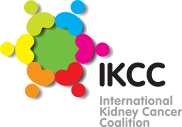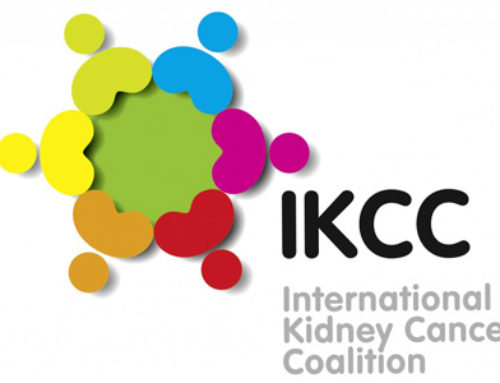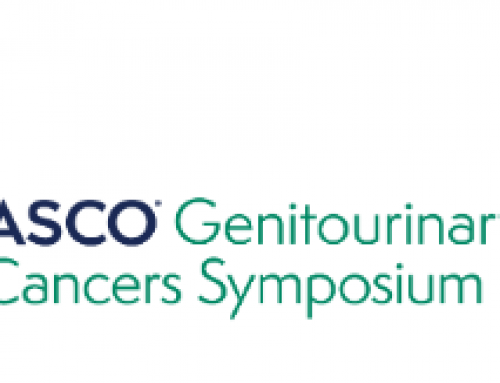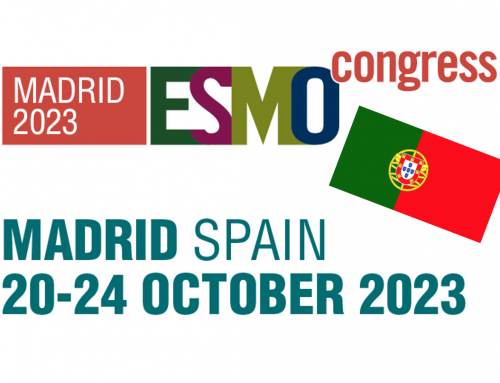By: Deb Maskens, Vice Chair, International Kidney Cancer Coalition (ikccv2.wpengine.com)
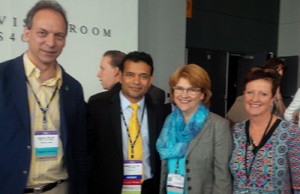
Andrew Weller, Chairman, Kidney Cancer Canada; Dr Monty Pal, Global Resource for Advancing Cancer Education (GRACE), Seattle WA; Deb Maskens, Vice-Chair, International Kidney Cancer Coalition (ikccv2.wpengine.com); Belinda Jago, ANZUP Clinical Trials Group, Melbourne, Australia
This year’s ASCO (American Society of Clinical Oncology) meeting in Chicago, June 3-7, had the theme: “Collective Wisdom, the Future of Patient-Centered Care and Research”. This meeting hosted over 30,000 attendees, including cancer researchers and healthcare professionals from all over the world, and a small but very active group of some 400 patient advocates focused on various aspects of cancer care, survivorship, and health policy issues.
Attending on behalf of the International Kidney Cancer Coalition (IKCC), I had the opportunity to attend sessions focused on health system sustainability, compassionate access, survivorship care, and of course specific medical updates in kidney cancer. What follows is my personal summary of highlights and take-aways as a metastatic RenalCell Carcinoma (mRCC) patient and patient advocate.
Kidney Cancer Updates
Two major papers for kidney cancer were much anticipated and presented at a joint session on Sunday June 5th:
Cabozantinib: Dr. Tony Choueiri presented the Overall Survival (OS) data from the METEOR clinical trial. (At a previous conference it was noted that cabozantinib was superior to everolimus in this trial based upon PFS data (Progression Free Survival – or the period during which the cancer does not get worse.) At ASCO, Dr. Choueiri presented the difference in overall survival from those patients who had taken cabozantinib versus everolimus. The OS difference is statistically significant at approximately 5 months. Note: while this trial cannot be compared head-to-head with the CheckMate 025 trial, the overall survival benefit appears to be the same as nivolumab, another drug compared to everolimus in a different trial. For a more detailed review of Dr. Choueiri’s presentation, see: http://meetinglibrary.asco.org/content/122708?media=vm
What does this mean to patients? It looks like cabozantinib will become a viable option for patients whose disease has progressed on a first-line VEGF-TKI (e.g., following sunitinib or pazopanib). However, access to cabozantinib depends upon regulatory approval and reimbursement. Currently cabozantinib is FDA approved in the United States under the brand name Cabometyx.
Nivolumab: Dr. David McDermott presented long-term survival data from earlier Phase 1 (34 patients) and Phase 2 (167 patients) studies of nivolumab in kidney cancer, noting that some 30% of patients were alive at the 4-year mark. Of those, a significant portion of those long-term survivors showed no response to nivolumab (had either SD (stable disease) or PD (progressive or worsening disease) as their best outcome. Toxicities were noted over a 50-month timeframe showing that the vast majority of toxicities happened in the first 6 months, and hardly any were noted beyond one year. For a more detailed review of Dr. McDermott’s presentation, see: http://meetinglibrary.asco.org/content/122769?media=vm
What does this mean to patients? Lots of questions about how immuno-oncology (e.g., nivolumab) works and for which patients (noting there is no biomarker). Traditional measures of response (e.g., tumour shrinkage) seem to be inadequate to determine long-term patient benefit. Complete response (or “NED – No Evidence of Disease) may not be realistic because a long-term durable response may be seen without completely removing all evidence of disease. Certainly there were lots of questions about the data that will be more fully answered by observing the results of those patients who participated in the bigger Phase 3 clinical trial.
Nivolumab questions asked by researchers:
- Are we using the correct dose and schedule?
- Could treatment be stopped after xx months?
- How can we pre-select those patients who are most likely to benefit and advise those who are most likely not to benefit?
Clinical Trials in Kidney Cancer
Now more than ever before, clinical trials present an excellent opportunity for kidney cancer patients to access new medications and to contribute to finding the best treatments. Clinical trials are available in numerous countries from the moment of diagnosis through to advanced disease. Many of these trials are recruiting kidney cancer patients specifically, and some will accept patients with various types of solid tumours (renal cell carcinoma being one). Patients are advised to ASK and keep asking about clinical trials as options.
Lots of information about clinical trials for kidney cancer patients is up on our website: www.10forIO.info We regularly post updates about new clinical trials on our Facebook and Twitter accounts as @IOkidney. Be sure to follow these accounts online and bookmark the website as one of your sources for kidney cancer information.
Outside of Clinical Trials…
With new treatments becoming available, there are many unanswered questions about how clinical trial results will translate to real benefit in clinical practice. The number of potential sequences is growing exponentially and there is no agreement, even among the top experts in kidney cancer. (Of course from a patient perspective, the *best* sequence will be a sequence of ONE treatment that really works and is durable!) Researchers and advocates alike are calling for the collection of Real World Evidence (RWE) through patient registries that track patients over the long-term. Patients should ask about whether their information is being collected and shared for the benefit of all.
Lots More on ASCO.org Website
Lots more updates in kidney cancer were presented (see http://am.asco.org/abstracts) for updates on brain metastasis, stereotactic radiation, and many trials reporting on use of new agents including avelumab, atezolizumab, pembrolizumab, alone and in combination. For a great article on emerging combination therapies for kidney cancer see this Editorial by Drs. Rana McKay and Tony Choueiri:
https://am.asco.org/emerging-role-combination-immunotherapy-regimens-metastatic-renal-cell-carcinoma
Closing Thoughts
Sessions on “Compassionate Use” and “Financial Toxicity” served as an important reminder that none of this research will help patients unless the treatments are affordable and offer VALUE (a word spoken 1,000 times at ASCO this year). While existing “Value Frameworks” from ASCO (and ESMO and other organizations) attempt to quantify value to our healthcare systems, we all need to remember that patients, caregivers and families have social values that also need to be integrated.
When all is said and done, all of this research is for patients towards a cure. As U.S. Vice President Joe Biden said in his address to ASCO, we need to work together like never before, to collaborate in ways we have not seen before – across cancers, across borders, breaking down any barriers that get in the way of progress. Patients will need to be equal partners – as one motto says “not FOR us, but WITH us”.
We look forward to your comments on this summary.
